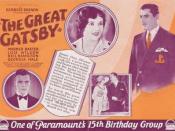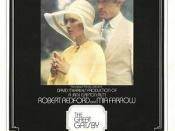James Baldwin looked upon reality and illusion through the eyes of a great author.
He saw that all authors live in reality, while everyone else lives in a sense of illusion, or not
knowing the whole truth. He shows us that the author must question everything, breaking
down the illusions that are set up by people and by our society. Baldwin shows that
normal people don't question everything, and therefore are fooled by illusions may times.
In The Great Gatsby Fitzgerald suggests many things about illusion and reality. I think
that the strongest thing Fitzgerald suggests is that you create your own illusion, and with
this illusion, you shape the person that you are. All of the rich people in this book have
some sort of illusion surrounding their persona, but Gatsby has the greatest of all illusions
surrounding him.
Gatsby is presented as living the charmed life, with plenty of friends, no problems,
and an honest man.
In the end his whole illusion unravels and we find that he has plenty of
problems, is very crooked and dishonest, and has no true friends. He longs for
companionship with Daisy, and still can never have that. Gatsby's illusion surrounding
him is totally shattered in this book, partly through the actions of Tom who feels that he
must discredit his name. Tom, however discredits name to draw Daisy away from him
when he finds that Gatsby has become interested in Daisy. When Tom confronts Gatsby,
and begins to crumble his illusion, Gatsby is as cool and confident as he always is.
Tom's voice, incredulous and insulting: I told you I went there [Oxford],' said Gatsby.
'I heard you, but I would like to know when.'
'It was in nineteen-nineteen. I only stayed for five months.'
Tom glanced around to...


